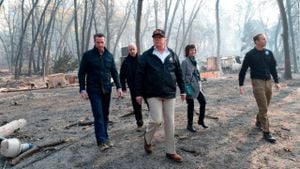On January 20, 2021, President Donald Trump made headlines with the swift signing of several executive orders aimed at dismantling key climate policies established by the Biden administration. On his first day back at the helm, Trump wasted no time reversing initiatives addressing climate change, scientific integrity, and energy production, signaling a dramatic shift back to fossil fuel reliance and deregulation.
One of Trump's first acts was the disbanding of the Interagency Working Group on the Social Cost of Greenhouse Gases, which had been formed by President Biden to analyze the economic impacts of climate policies. This group had been responsible for producing estimates on the social costs of greenhouse gases, factoring in human health effects, property damage, and disruptions to energy systems impacting policy-making across federal agencies.
“The calculation of the ‘social cost of carbon’ is marked by logical deficiencies, a poor basis in empirical science, politicization, and the absence of a foundation in legislation,” trumpeted the executive order titled ‘Unleashing American Energy.’ This move has drawn criticism from environmental advocates who argue it undermines the scientific basis for regulating emissions and harms the overall climate policy. Trump's order explicitly directs agencies to reconsider the underpinnings of environmental regulations, including the Environmental Protection Agency’s “endangerment finding” related to the dangers of greenhouse gas emissions. Agencies are tasked with reporting back on the legality and applicability of this finding within 30 days.
Further signaling his administration's commitment to fossil fuel interests, Trump paused the distribution of funding appropriated through the Inflation Reduction Act and the Infrastructure Investment and Jobs Act, money aimed at promoting greener technologies, such as electric vehicle charging infrastructure put forth by Biden-era initiatives. By halting these funds, Trump sent clear signals of his administration’s priorities and set the stage for reviving traditional energy sectors at the potential cost of renewable ventures.
Trump's energetic push also culminated with the issuance of orders aimed at declaring an 'energy emergency' to prompt faster energy project approvals across federal and private lands, particularly for oil, natural gas, coal, biofuels, and nuclear resources. This declaration is reportedly linked to the administration’s view of heightened energy demands, particularly relating to advancing technologies like artificial intelligence. By leveraging any available legal emergency authority, Trump aims to fast-track energy projects.
Yet, not all of Trump's executive actions targeted bolstering fossil fuels. He took calculated steps to limit wind energy expansion by withdrawing the Offshore Continental Shelf from new wind energy leasing and pausing approvals for existing projects. His directive to cabinet members was to review the federal wind leasing process and assess the environmental impact of “defunct and idle” windmills, marking another retreat from the prior administration's renewable energy efforts.
Trump’s early moves to revoke various climate-related executive orders issued under Biden reveal his administration's aim to dismantle the previous administration's legacy rather than propose new construction or regulatory frameworks. This includes dissolving the National Climate Task Force and discontinuing the State Department’s Climate Change Support Office, which were pivotal in establishing systemic approaches to fight climate change.
Despite Trump's assertions, environmentalists and many media commentators have expressed concern about the potential ramifications of this agenda. Activist and advocacy groups have launched campaigns to contest these executive orders, likely spotlighting the legal challenges they may provoke as they clash with established environmental regulations. Critics contend these policies could lead to increased greenhouse gas emissions and exacerbate climate change.
The significance of Trump's early actions on domestic policy cannot be overstated. While he positions his administration as favoring rapid development and energy independence, the long-lasting consequences of tackling climate change through deregulation and undermining scientific integrity remain to be seen. This fundamental shift away from climate-conscious strategies places the U.S. back onto its traditional path of energy production, fundamentally reshaping the discussion about environmental responsibility for years to come.



